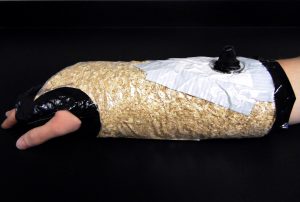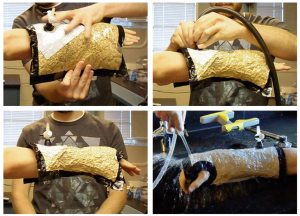University of Tennessee Knoxville
2016 BMEidea First Prize Winner – $10,000
TREAT Prize Winner – $1,000
The team members:
Graham Taylor, PhD 2016, Biomedical Engineering
Caroline Bryson Black, PhD Candidate, Biomedical Engineering
Guru Venkatesan, PhD Candidate, Biomedical Engineering
John Till, PhD Candidate, Biomedical Engineering
Tony Nguyen, MS 2016, Biomedical Engineering
Reza Abiri, PhD Candidate, Biomedical Engineering
Richard Steiner, PhD Candidate, Biomedical Engineering
Collaborators:
Dr. Matthew Mench, University of Tennessee – Knoxville
Dr. Xiaopeng Zhao, University of Tennessee – Knoxville
Summary of problem & solution:
Every year hospitals around the United States see collectively 6-7 million bone fractures. The typical treatment provided for this type of injury is a cast made of plaster-of-paris bandages. These orthopedic casts stabilize bone injuries until the bone is completely healed. However, there are numerous downsides to this type of cast: it has a long application time, it cannot get wet, and it can cause skin and health complications. FastCast overcomes these problems: it’s easy to apply and remove, waterproof, allows visualization and breathability of the skin, and is applicable to any extremity. The cast uses a new “particle jamming” technique where the chamber is filled with biocompatible particles that are jammed together when the chamber is placed under negative pressure. The change in pressure creates immediate stabilization for the bone, making application possible in less than two minutes compared to the 30-60 minutes it takes for a plaster cast. FastCast will improve patient experience and save cost and time.